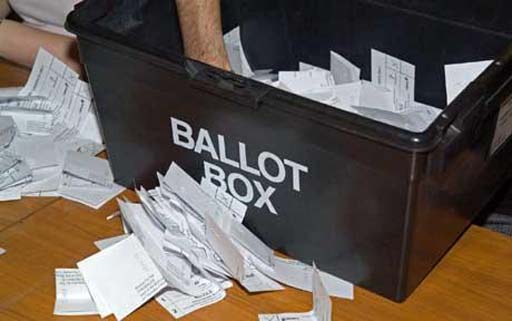Monday 7 May 2012 Monday 7 May 2012
A political system on trial
Richard North 07/05/2012 A tale of two elections
In the exit poll he gets about 52 percent, with Nicholas not wanting to prolong the agony andconceding defeat within half an hour of the last polling stations closing.
In a way, the lack of fire mirrors the successful candidate, a grey enarque who is unlikely to rock any boats, particularly on the EU front. Those analysis who expect there to be a change in the Franco-German relationship are likely to be disappointed.
What is thus likely to be of more interest is the Greek election, where the voters have done what we so wish would happen here – ditched the two establishment parties and gone for the minnows.
However, one of the pair, the conservative New Democracy, which was polling 28 percent in October 2010, before the financial crisis really bit, has shed less than ten percent, according to exit polls. It has come in with 19-20.5%, roughly on a par with that it was getting last February.
While in France, the socialist Hollande is on the up, it is the socialist PASOK – formerly the lead party – which has really taken the hit. It has dropped back from the 40+ it was polling on October 2010 but has clawed back some ground from the 8 percent it was getting in February, to end up with 13-14 percent. The big winner is the radical left coalition, or Syriza, with has come in with 15.5-17 percent, although the extreme right-wing Golden Dawn is also set enter parliament for the first time, polling between 6.5 and 7.5 percent.
Such is the voting split, though, that there is no chance of a stable coalition being formed, leaving Greece on a par with Belgium – without a government.
"This is a major political earthquake," senior New Democracy official Panos Panagiotopoulos says. "It is an explosion of anger and despair". His party is duty bound to try and form a government, but hopes are not high.
Says the outgoing deputy prime minister and senior PASOK official Theodoros Pangalos: "The truth is here - the reality of this result is that at the moment this produces no government. It is not a question at the moment of who gets a little more or a little less".
The English-language Kathimerini newspaper - demonstrating a propensity for understatement that the British would once have claimed for their own - also tells us the outcome of the election has increased the chances that the country will not have a strong, stable government any time soon.
The result, continues the paper, elevating understatement to a statement of the bleedin' obvious, raises political uncertainty and puts at risk Greece's position in the euro area. Snap elections, it says, may or may not be a solution. The only certain thing is that the economic consequences of the election will become obvious shortly.
We would never have guessed that.
COMMENT THREAD
Richard North 07/05/2012
Monday, 7 May 2012
Thus we have Robert Winnett, "Political Editor", no less, telling us that last week Labour won more than 800 extra council seats and the Conservatives' share of the vote fell to just 31 percent.
But it didn't. On a turnout of 32 percent, the Tory share fell to less than ten percent – 9.92 percent, to be exact. Less than one in ten of eligible voters in this election were sufficiently attracted by an idea of a Conservative administration to get out and vote for one.
Nigel Jones in the Wail has got it, so it can't be that hard to understand. Only 12 percent of electors voted Labour, he writes. And when the two leading parties together attract only just over 20 percent of the popular vote, this is a crisis for democracy.
Pretending it isn't happening, and adopting a business as usual model, is not a sensible response. The entire political system is now on trial, and the pain is not going to go away until it is dealt with.
Although commentators tried inject drama to the contest with suggestions of a last-minute surge for Sarkozy, it was always going to be Hollande, thus robbing the French presidential election of any real fire.
Posted by
Britannia Radio
at
08:42
![]()























